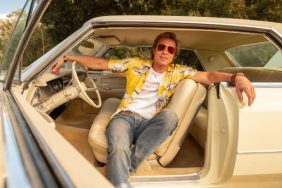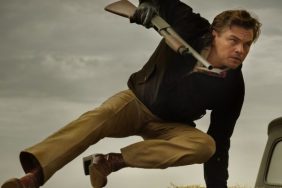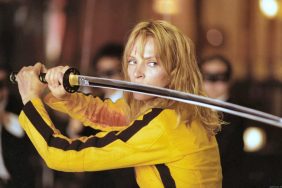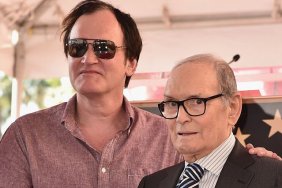It’s no secret that Quentin Tarantino is an Ennio Morricone fan. Morricone, 87, has authored over 500 film scores in his decades-long career, including some of the most iconic western themes ever heard, as well as shorts, TV specials, obscure Italian indies, grindhouse gialli, and well-known Hollywood blockbusters. Morricone, the story goes, had to be convinced in person to write a single theme for Tarantino’s The Hateful Eight. Morricone eventually submitted and went on to write the film’s entire score.
That score has, as of tonight, won Ennio Morricone his first Academy Award. Morricone had previously been nominated for six Oscars, the last time being in 2000 for the film Malèna, and was given an honorary Oscar in 2007 for his breadth of work. But tonight, he was finally recognized by his peers in the American filmmaking community. The 87-year-old was humble, and gave tribute to John Williams, also nominated this year.
Also: Oscars 2016 | The 5 Biggest Surprises of the Night
Morricone has been daring in a way most American composers aren’t. He has been consistently willing to experiment with sounds, weird vocals, and instruments that weren’t necessarily in his wheelhouse. His scores may be recognizable, but he has always been sure to be creative. He has been both bombastic and minimalist. Cultish and mainstream. Atonal and musical. He is a musical polymath of the highest order, and his won tonight is a long-due emblem of his bottomless talents.
This is, of course, the best possible time to celebrate Morricone, his work, and his overwhelming contributions to the world of film music. As such, Crave presents the ten best Ennio Morricone scores. There is a ranking, of course, but every single one of them is worthy of your ear.
10. The Legend of 1900 (1998)
This little-seen indie oddity from the late 1990s came at a time in Morricone’s career when his output had slowed. The film is about a baby who is born on board a ship, and who, despite all of his long life’s dramas, never leaves. The boy grows up to be a virtuosic piano player. Films about geniuses are difficult to do, as the talked-about genius is, by artistic necessity, rarely displayed. How can a filmmaker recreate actual genius on a dime? Morricone, however, managed to infuse the lead character’s piano playing with actual heart and love. The above piece is the great love theme of the film, and it sounds like an ancient lost love song.
9. The Bird with the Crystal Plumage (1970)
The Bird with the Crystal Plumage was one of Italian horror director Dario Argento’s early efforts (read: one of Argento’s better movies, since his newer films leave a lot to be desired), and its effectiveness was largely due to the spooky Morricone music. The film’s inciting actions take place in a museum, and the gentle, lilting vocals of the soundtrack evoke a quiet, eerie place. It’s music that sounds like a folk concert gone horribly wrong.
8. Exorcist II: The Heretic (1977)
Although John Boorman’s infamous sequel to the 1977 classic horror film is perhaps one of the most ridiculous and misguided sequel attempts in cinematic history (hypnosis computers! repossession via regression! James Earl Jones in a cricket costume!), the music cannot be faulted. The floating voices on the soundtrack are easy to listen to, almost loving, gorgeous, and boldly orchestral. The backing score plays perfectly with the elaborate guitar in the foreground. It’s just a great score. If you like this theme, you can hear it used, wholesale, in The Hateful Eight. Yes, Tarantino borrowed it.
7. The Thing (1982)
If you are a fan of director John Carpenter – and who isn’t? – then you’d be forgiven for thinking that Carpenter himself composed this music. Carpenter did famously minimal themes for his movies, and the theme for The Thing is as bare-bones as they come. A close listen, however, reveals several quiet, sinister levels of strings, electronics, and alien who-knows-what underneath. It’s almost church-like in its quietude. Then, of course, it explodes. Gotcha.
6. The Mission (1986)
Morricone’s score for The Mission – a film about a religious conflict gone awry – is, perhaps obviously, quoting a lot of old hymns. But then Morricone does the score one better by folding in an adventurous violin backup, a few notes of modern electronic beeping, and a growing – almost Ravel-like – cadence. The Mission is one of the best films of 1986, and it is not recognized enough. Morricone’s score may be the best selling point.
5. Once Upon a Time in the West (1968)
Morricone is best known for his work on the most iconic westerns of the 1960s and 1970s, lending the genre its entire sound. Morricone ensured that viewers knew about the maudlin, epic emotions of spaghetti westerns. In his hands, a western could rise above cheap gunfights and simplified characters. His overwhelmingly dramatic score to Once Upon a Time in the West is an old man taking you by the hand, and walking with you along the beach until sunset.
4. The Untouchables (1987)
Pulp heroism rarely looked better than it did in The Untouchables, the story of Eliot Ness and his battles with crime lord Al Capone. Morricone had little interest in playing it small this time around and turned the Untouchables into, more or less, urban superheroes. His score sweeps and declares. It’s noisy pulp. And it’s amazing. It may clash with some of the film’s grittier dialogue but still manages to elevate and already-great film.
3. Investigation of a Citizen Above Suspicion (1970)
When I said Morricone liked to experiment, I wasn’t kidding. Want a movie score that’s centered on an oud, a jaw harp, a cello, and an oboe? You got it. In Elio Petri’s crime drama Indagine su un cittadino al di sopra di ogni sospetto – an Oscar-winner for best foreign film – a cop deliberately commits crimes to prove that he will never be arrested. There is a twisted glee in his amoral stance, and the music reflects his wicked, outward, grinning hate. It’s a catchy, weird, off-putting, and totally amazing film score. It’s a syncopated clock that wants to strangle you. What pleasure.
2. The Battle of Algiers (1966)
Gillo Pontecorvo’s The Battle of Algiers is easily one of the best war movies of all time. It’s bleak, realistic, and, while it does sympathize more with the rebels than with the military, it sees all combat as a tragic, self-perpetuating machine. Morricone’s score is used sparingly, but when it is, it doesn’t interrupt the naturalness of the film. And yes, in Morricone’s ears, war is nothing but tragic. There is no triumph in a film like The Battle of Algiers.
1. The Good, The Bad, and the Ugly (1966)
Because, of course. One cannot discuss Ennio Morricone without talking about his scores for The Good, The Bad, and the Ugly, or its two precursors, A Fistful of Dollars, and For a Few Dollars More (and, to a lesser extent, Duck, You Sucker). You know these themes by heart. They’re part of the western firmament. You need no recommendation.
Top Image: The Weinstein Company
Witney Seibold is a contributor to the CraveOnline Film Channel, and the co-host of The B-Movies Podcast. He also contributes to Legion of Leia and to Blumhouse. You can follow him on “The Twitter” at @WitneySeibold, where he is slowly losing his mind.
8 Actors Who Won the Wrong Oscar
8 Actors Who Won The Wrong Oscar
-
Leonardo DiCaprio

Won: Best Actor, The Revenant
Should Have Won: Best Actor, The Wolf of Wall Street
Leonardo DiCaprio's icy endurance test will forever be remembered as the film that won him an Oscar, not as his best work. For that, turn to Martin Scorsese's ebullient and damning recollection of 1980s excess, with a performance by DiCaprio that is equal parts horrifying and hilarious.
Photo: 20th Century Fox
-
Meryl Streep

Won: Best Actress, The Iron Lady
Should Have Won: Best Supporting Actress, Adaptation
To be fair, Streep had already won two Academy Awards, but her win for The Iron Lady was her first Oscar in 29 years, and she had been nominated 13 times in the interim. Sadly, her turn as Prime Minister Margaret Thatcher is one of her worst films from those three decades. Adaptation, on the other hand, gave her one of the most remarkable roles of her career, and is still celebrated almost 15 years later while The Iron Lady, less than five years later, has been all but completely forgotten.
Photo: The Weinstein Company
-
Colin Firth

Won: Best Actor, The King's Speech
Should Have Won: Best Actor, A Single Man
Colin Firth gave a perfectly respectable performance as the stammering King George VI, but it's such an unremarkable film that his win can't help but play like an apology. The year prior, Firth gave one of the best performances of the decade in the insightful character study A Single Man.
Photo: The Weinstein Company
-
Kate Winslet

Won: Best Actress, The Reader
Should Have Won: Best Actress, Eternal Sunshine of the Spotless Mind and Best Supporting Actress, Sense and Sensibility
After nearly 15 years of Oscar-worthy performances, the Academy finally gave Kate Winslet a trophy... for one of her worst films. Her iconic turns in Ang Lee's Sense and Sensibility and Michel Gondry's Eternal Sunshine should have already made her an Oscar-winner twice over.
Photo: The Weinstein Company
-
Morgan Freeman

Won: Best Supporting Actor, Million Dollar Baby
Should Have Won: Best Actor, The Shawshank Redemption
One of the most respected actors of his generation, Freeman only received an Academy Award for an unremarkable supporting turn in Clint Eastwood's once-popular, now mostly disregarded boxing drama. And yet his Oscar-nominated turn in The Shawshank Redemption, a modern classic, remains one of his greatest performances.
Photo: Warner Bros. Pictures
-
Russell Crowe

Won: Best Actor, Gladiator
Should Have Won: Best Actor, The Insider
Russell Crowe was in the middle of an epic streak at the turn of the century, starring in one great film after another. And yet while Gladiator may be a solid flick, it's a generic action hero performance from Crowe, who did more nuanced and impressive work in Michael Mann's cigarette company exposé The Insider just one year earlier.
Photo: Dreamworks Pictures
-
Judi Dench

Won: Best Supporting Actress, Shakespeare in Love
Should Have Won: Best Actress, Mrs. Brown
Dame Judi Dench's win for Shakespeare in Love is considered one of the funniest jokes in Oscar history. She's barely in the movie and has very little to do or say when she does appear on camera. It seems to be yet another apology: her incredible performance as Queen Victoria in Mrs. Brown was nominated, but not rewarded the year before.
Photo: Miramax Films
-
Al Pacino

Won: Best Actor, Scent of a Woman
Should Have Won: Best Actor, Serpico and Best Actor, The Godfather Part II
Al Pacino, one of the most celebrated actors in history, only has one Oscar, and it's for... well, not his WORST movie, but easily his most mockable. His mannered performance in Scent of a Woman comes complete with a quirky catchphrase ("HOO-ha!"), and pales in comparison to many of his great performances, particularly from the early 1970s, when he did some of the best acting of his career or anybody else's.
Photo: Universal Pictures









